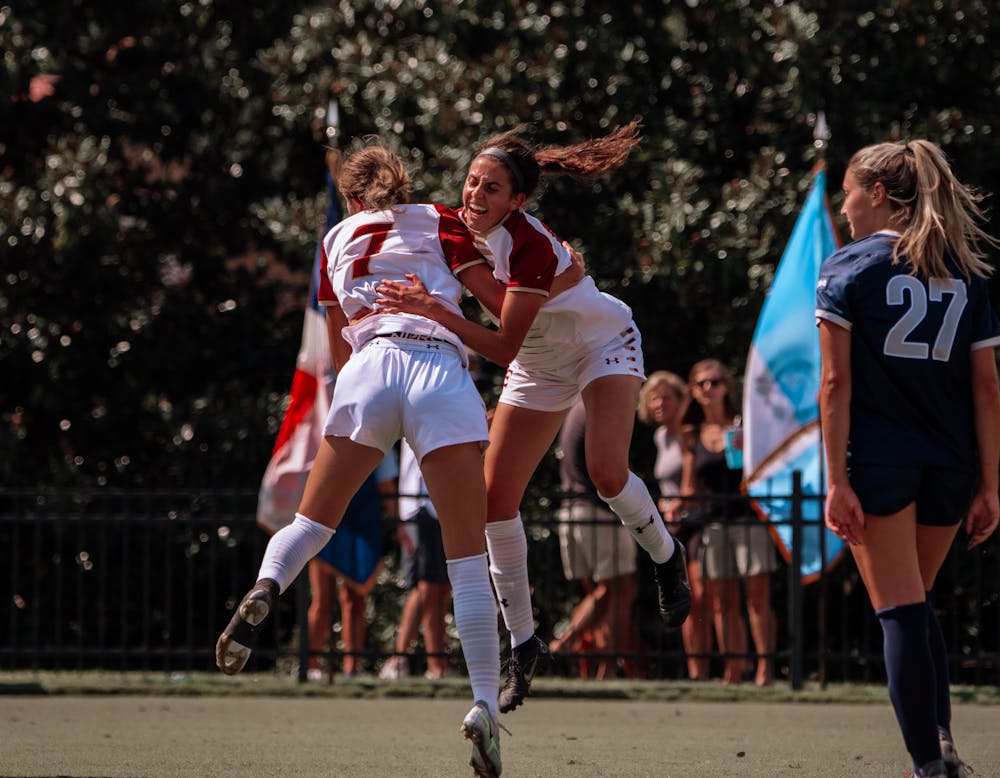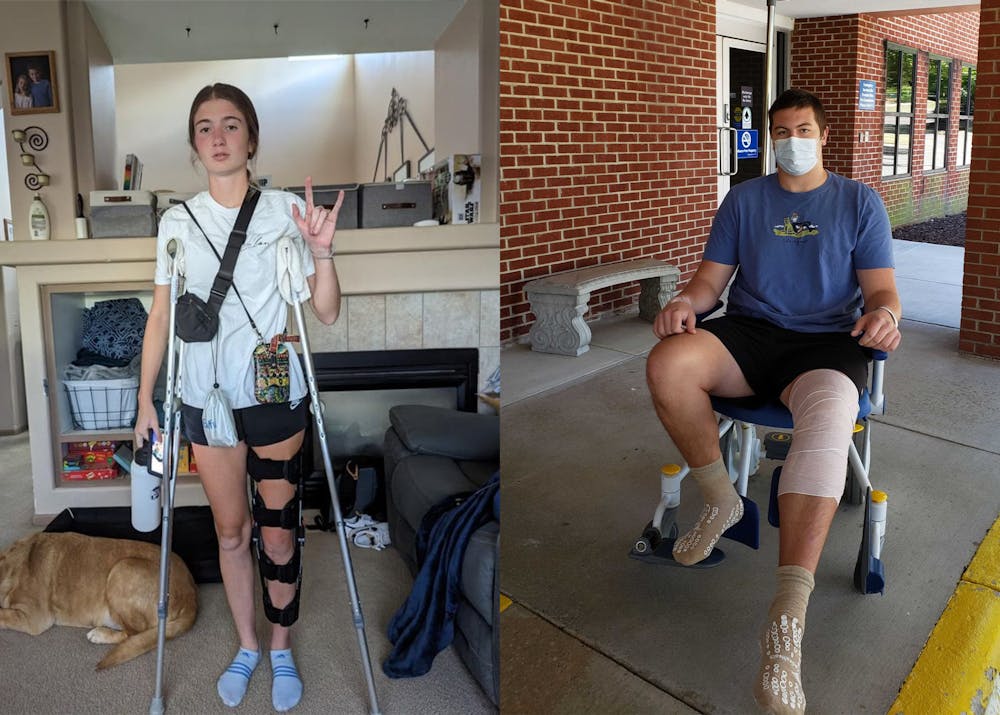Season-ending injuries are an unfortunate, but common staple of collegiate athletics. Around 210,000 college sports-related injuries occurred from 2009-14, according to a Centers of Disease Control and Prevention study. Within that number, almost 4,000 athletes each year experience a season-ending injury, according to a study published in the Journal of Amateur Sport. These injuries are more than just a number, though. Each one affects a student-athlete in a different way, each student-athlete grapples with the absence of sport differently and each recovery process is different.
It was Elon men’s soccer redshirt junior Ryan Manna’s sophomore year, and the team had recently played the University of North Carolina at Chapel Hill. The following day, the team had a light training session, and that’s when he heard it.
Manna’s teammate went in for a tackle, but rather than acquiring the ball, he hit Manna’s knee, and Manna heard the all-too-familiar pop.
Manna had torn his ACL, forcing him to undergo his third major knee surgery in his soccer career. It took a year for Manna to fully recover, and the rehab process took a mental toll on him. Manna said it’s just a different feeling when you are on the sideline, standing there, uninvolved.
“It was my third one and it takes a toll on you sitting out from the sidelines and wishing you were out on the field,” Manna said. “I would go out there and do anything for them, run as many miles as I could for them, or do as many sprints. So it kind of sucks when they're out on the field and I'm there, and I can't give them my all.”

Manna said the rehab process was very painful at times, and it took a while to get over the hump of the mental aspect. One way he got over it was through his brother Jake. His brother, who has had two ACL surgeries, comforted and mentored Manna through this difficult time that they shared. Manna distinctly remembers when Jake looked him in the eye and asked him what he really wanted. Manna replied, saying that he wanted to go pro and be the best he could for Elon once he recovered.
After this, Manna’s brother helped him focus on beating the injury that plagued him twice before and gave Manna a rigorous schedule to follow. For the entire 2023 season, Manna got up at 5 a.m., was on the field training by 5:30 a.m., trained with the team at 8 a.m., and after the team was done, Manna would continue to train or lift.
While Manna was rehabbing, he would attend many of the team’s games, offering support to his teammates. As Manna started to heal and get closer to a point where he could put his foot to the ball and play like he used to, his mindset changed.
“In the beginning you have that thought of, ‘Oh, I might not ever be able to get back to where I was,”’ Manna said. “But then now looking at how much progress you made within that time, it really gives you motivation to keep going because you know that you can get better, no matter what, you can always get better.”

Ryan Manna passes the ball to Jake Kelly. The Phoenix beat Campbell in a 1-0 shutout Sept. 29, 2021. ENN file photo.
After tearing his ACL midway through the 2022 season, Manna was fully cleared to play at the end of Sept. 2023. However, because the season was already in progress and Manna had missed a year’s worth of not playing, the team decided to ease him back in. Manna didn’t play at all in the 2023 season, rather was implemented into training sessions with the team.
Manna has finally returned to action this season, scoring 2 goals and 3 assists so far, and is trying to prove himself.
“There's definitely a chip in my shoulder to go out there and, not only prove to everybody else, but prove to myself that I didn't put all this work in for nothing,” Manna said.
Elon women’s soccer redshirt sophomore Isa Murdock was coming off a freshman year where she played in every single game and ranked third on the team in points, tied for third in goals and tied for fourth in assists. It was after the season in the spring of 2023 when she tore her ACL, delaying her prospects of a successful sophomore season.

After getting surgery in May of 2023, Murdock went home for the summer, staying immobile most of the time, trying to adjust to her first ever injury. Murdock said it was hard not being active.
“One thing people don't take into consideration is, yeah, you can't play soccer, but, you can't do anything that you normally used to do,” Murdock said. “I like playing spike ball, I like to run, I like to do all that stuff and, that's just all ripped away from you.”
When she returned in the fall, Murdock — who has never had to sit out of soccer her entire life — had to learn how to support her team in a new way.
“Every day you show up and you just got to sit there and watch,” Murdock said. “It was just like a different kind of aspect that I had to learn. I had to find a different joy in it.”
Murdock went to every practice but was often separated from the team while she did rehab work. During games, her primary role was supporter. Murdock said this separation made her feel disconnected from her teammates at times especially when she didn’t travel with the team, preventing her from getting to know her teammates well enough.

The Phoenix had a rough 2023 season, going 3-9-5, and it was hard for Murdock to watch without being able to help. She said the season felt long, but eventually realized that she couldn’t help the team on the field and had to focus on strengthening her knee and getting back in shape.
“It was really hard to just sit there and watch, but I just tried my best to be positive when everything wasn't going that great,” Murdock said. “On the sidelines, I just tried to be super supportive and cheering everyone on, and then I would talk to everyone. I would just kind of listen to complaints about why people were frustrated.”

A monumental moment in her recovery process was when she started moving again. She said it was important when she was able to take a step without being scared to do it.
“You took the little wins as big wins and obviously the confidence slowly came back, but just took time,” Murdock said.
When she first got cleared to play soccer again, she said it felt awkward and didn’t feel like herself. Murdock said she felt slow and it took time to get used to the level of contact soccer had after months of rehab where people didn’t touch her.
Going into this season, Murdock set goals for herself to make sure her hard work paid off and has had an excellent start to the season this year, co-leading the team with 5 goals.
Luke Duska, a redshirt junior offensive lineman on Elon’s football team, has battled through a pair of devastating injuries during his time at Elon. It began with his left knee. On the fourth practice of fall camp of his freshman year in 2021, one of Duska’s teammates ran into the back of his leg and it snapped forward, tearing the ACL. Two years later, in August 2023, during the last scrimmage of fall camp, Duska tore his ACL again, this time in his right knee.
“It was kind of just on a normal play,” Duska said. “I was just in pass protection, and I planted on my right knee, I guess a little too hard, and my ACL tore in that knee completely.”

Duska — who said a player can return to sport after 12 months, but it takes two years to fully recover from a torn ACL — had two of these injuries in a span of two years.
“It took a second for me to get over the disappointment of it happening again, and then getting the surgery and knowing what was in front of me because I'd done it before, and then knowing that I was about to go through it again, it was kind of it was tough, for sure, to envision myself doing it,” Duska said.
After surgery, the mobility in his knee was completely shut off. Duska said he felt helpless at the beginning of the rehab process. He said early on during the rehab he tried to get his quad moving so he could get mobility back in his knee. Once he got mobility back, he began strength training and started running again around the three month mark.
For the remainder of the recovery process, Duska focused on strengthening his knee to a position where he could play football. Duska often rehabbed at practices while the team conducted a standard practice session. Duska said rehabbing was isolating when the rest of the team would be preparing for a game, while he was off to the side doing his own training.
“It's tough when you're not practicing every day, you're just naturally going to feel a little isolated from what everyone else is doing because everyone else is kind of on the same routine and doing the same things every day,” Duska said. “You're still around the team, but you're off to the side doing your own specific thing every day going through your rehab.”

Redshirt junior Luke Duska, standing opposite No. 52 Alex Olander, blocks Olander during football practice on Oct. 15.
Even as Duska got better and progressed through rehab, it was hard to build confidence that he would be OK.
“As much as you rehab and gain confidence doing weight training and individual drills and things like that, until you're actually playing football, it still takes time to kind of trust yourself mentally,” Duska said. “But you just can continue to gain confidence as you go along and just keep doing what you've done in the past, and it just comes back naturally over time.”
Duska has returned to football and has played in every game so far and said it was a surreal experience to return to the sport he loves. Duska acknowledged recovering from season-long injuries is extremely tough, but believes perspective is the key to overcoming them.
“Once you're able to put it in perspective and realize it's not the end of the world, it's just a minor setback that you can overcome if you put in enough work to do it, once you get to that place, it all kind of happens naturally,” Duska said.


